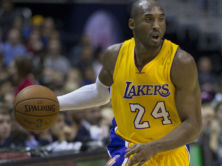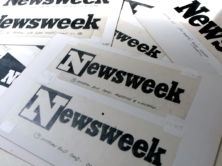
John Hamer is president and co-founder of the Washington News Council. (Credit: Washington News Council)
The Minnesota News Council’s January 2011 closing leaves just just one U.S. news council still active — the Washington News Council, based in Seattle.
American Journalism Review referred to the Washington News Council when defining news councils’ role: “The news council concept is simple. When a consumer feels wronged by a media outlet and his attempts at redress are not satisfied, he can waive the right to sue and file a formal complaint with the news council.”
iMediaEthics spoke with Washington News Council president John Hamer by phone last week about the council and its work. Hamer explained why he’s involved with the news council, which he co-founded in 1998: “I’m doing this because I believe it’s important. I believe we’ve helped a lot of people and it’s a lot of fun in many ways. I love to engage journalists in talking about what they do and why they do it.”
Read our Q & A below with Hamer. Note: The interview has been edited for length:
iMediaEthics: Why do you think news councils have been successful in other countries but not the U.S.?
John Hamer: “I think other countries that have successful press councils have a longer tradition of councils and organizations like this,” Hamer said. “I think it’s growing in other countries, especially in countries that have become more democratic and maybe they have a freer press so people are concerned about good high quality journalism.” By having “outside oversight,” Hamer sees councils providing an alternative to government tcontrol or influence on the press.
Hamer noted the Alliance of Independent Press Councils of Europe has a list of a number of the world’s “good ethical press councils.” That list includes a couple dozen European press councils and eight non-European councils (including the Washington News Council).
“Jumping to this country, I think that because of the First Amendment … I think journalists in this country tend to say ‘Hey, we need a free press. We can’t have any hint of certainly government regulation or control.’ And I think some of them think that press councils are a first step toward maybe government regulation or control or censorship or interference with the press.”
“I personally believe the opposite is true. Press councils are a defense against government control or regulation or interference. If I saw any hint that government agencies in this state or in this country were trying to crack down on the press or prevent them from being free, I would chain myself to the courthouse door, or whatever. I would protest that vigorously.”
“I think it’s a protection for the press to have an independent organization like us. We are truly independent. We take no government money. That’s one of our principles from Day One, because we didn’t want to have any appearance or hint of government influence.”
Regarding the U.S.’s national news council, which existed from 1973 to 1984, Hamer commented that he “thought it was a good idea.”
“I remember reading their findings and reading some of their cases. Interesting stuff. I think they did a lot of good work but The New York Times and The Washington Post never supported the idea and when the two biggest most influential newspapers in the country don’t support something like this it’s going to have an uphill battle. They did, I think. They [also] made a couple mistakes. A couple of their findings were controversial. They had trouble with money.”
iME: Why do you think the WNC is the only one left? What has made the WNC successful?
JH: “Keeping the doors open has been a challenge for 13 years, but we’ve managed,” Hamer said, attributing the group’s success to “hard work and perseverance” and a solid start. “You’ve just gotta plug away, do your best, ignore your critics, always be the bigger person, reach out to people, when you find supporters embrace them, when you find critics, be respectful, answer their concerns face to face.”
Commenting that “this is the toughest job I’ve ever had — starting a non-profit, getting it up and running from scratch…organizing just the whole thing,” Hamer said when the news council was created in 1998, he “put together a group of people who believe in it and think it is important.”
“I got a wide range of people and we were nonpartisan or bipartisan. A lot of people thought we’d be a right wing media bashing organization or a left wing media bashing organization. And I said no, we’re going to be very even, very fair, bipartisan. I can tick down our founding board — 6 Democrats, 6 Republicans. They might not have agreed on a lot of things, but they agreed on the need for accurate, ethical media.”
Also, the original council members were half journalists and half business people, including Bill Gates Sr. “To have him sign on as one of our original council members, our credibility just went through the roof.”
“I think that it is a loss for American journalism that we’re the only one,” Hamer said. “I think every state should have a news council like ours, or some kind of outside independent organization that can provide…oversight in a way. But we don’t police. We’re not a watchdog.”
Hamer added that none of the newspapers in Washington have an ombudsman or public editor, so even though social media and online interaction may have changed the way newspapers work, the news council isn’t out of business. The Minnesota News Council partially attributed its closing after four decades to social media replacing the need for the news council.
“My phone keeps ringing with people who come to us because they can’t get proper satisfactory response from the media organizations even with all the online tools,” Hamer said.
iME: In response to the American Journalism Review’s story about the council, you said the council has “lots of exciting plans for 2011 and beyond.” What are some of those plans and some of the projects the WNC is currently working on? Also in that report, you said that the council is incorporating “digital, real time ways” into the complaints discussion. How so and how does the WNC keep its complaints process and working process relevant?
JH: “That’s exactly what our reinvention of the news council is all about. We’ve totally redesigned our website in the last year or so,” Hamer commented. The news council has adapted its website to be interactive online, Hamer said.
“If you look at our website, we have this online community where people can join our community — Bill Gates Sr. joined. It’s a pretty interesting group. It’s not very large yet, but it has grown steadily. We’re trying to grow discussion online about media ethics issues.” (The community site states it has 85 members.)
Hamer added that the site has incorporated various widgets on its site, like for NewsTrust.net, MediaBugs.org and Report an Error. “We’re trying to experiment with the different tools available.”
iME: How many hearings does the WNC have a year? Is there any one issue that the council spends the bulk of its efforts working on?
JH: Hamer said that the council gets “not a huge number” of formal complaints, but that is because the council tries to avoid getting complaints to the hearing stage. Instead, the process for filing a complaint requires the complainant to approach the media outlet with its complaint and try to resolve its issue without ever reaching the hearing process. The council accepts complaints against all forms of media outlets — print, broadcast, and online.
“We try to find ways to resolve complaints before they get to the formal written complaint stage,” Hamer said noting that he receives lots of inquiries from the public about possible complaints.
“I spent a fair amount of time” hearing concerns from the public, even if they don’t go anywhere, Hamer said. “I spent a lot of time consulting” and he also speaks at meetings and schools.
“People are still afraid of the media,” Hamer said. “They are still intimidated by the media and its power. A lot of people inquire, think about it, and don’t file a complaint because they’re afraid the media will come back and hit them harder the next time. And I can’t promise that they won’t…Unfortunately, that’s the power of the media.”
“We’ve only had 4 formal hearings in our existence,” Hamer explained. “We try to avoid hearings. The hearing is a last resort.”
On the Washington News Council’s “Accomplishments” page, see the news council’s twenty-four filed complaints. Hamer noted that there is another complaint pending, but that the council has had about two complaints a year.
When they do have hearings, the state’s C-SPAN-like station, TVW, has broadcast the hearing statewide, Hamer added.
Also, in order to file a complaint, a complainant must agree not to file any libel or defamation suit against the news outlet over the case regardless of the council’s outcome. Hamer explained: “We don’t want to be used as a trial run for a libel suit. That would totally destroy whatever credibility we have with the press.”
Hamer added that the news council may provide a resolution to media errors where libel or defamation lawsuits won’t. Hamer said:
“People have been smeared by bad, inaccurate, sloppy, unethical, shallow stories in the media. They really have no further recourse. They have no place else to turn in most cases. People say, ‘Oh you can file a libel lawsuit.’ You know how hard it is to win a libel lawsuit? It’s really difficult to win a libel lawsuit….You spent a lot of money, you spend a couple years of your life. If you win, there’s no punitive damages. Maybe they’ll cover your attorney fees, that’s basically it. The news media know that. They can smear people with impunity.”
iME: Regarding the Complaints/Hearing Process? The WNC site states the council doesn’t “normally accept complaints about non-coverage.” Why?
JH: “If we went down that road, just think of it: There are so many really partisan, really divisive issues,” Hamer commented.
“We just decided early on if we accepted complaints about non-coverage that would be a really slippery slope. Who decides? I think you have to leave it up to the paper or news organization what to cover. They get to decide. If people are concerned about non-coverage, they can call and lean on me, but I just don’t see that becoming the topic of a formal complaint, because it just would open Pandora’s Box. I’m open to reconsidering, but it worries me.”
iME: And, in a hearing, what if there is no response from the news organization whatsoever — no statement or appearance?
JH: “The media has never show at any of our meetings. I regret that.”
“Having said that, in every case, they have responded to the complaint. They have responded in print, online, and in other media. Case by case, of the biggest cases we’ve had, the biggest complaints in every case, the media organization has in some detail — quite a bit of detail — they have responded to the complaints…But they didn’t have the courage to show up at the hearing and answer questions in public from council members about their performance and ethics.
“I attribute that to lack of courage. I think they, in most cases, knew their stories were flawed, knew they would be called out on the carpet, publicly, and they just didn’t want to go through that experience.”
“Our hearings have no legal power or authority. We can’t do anything to you guys [the media]. We can’t fine you, we can’t punish you. All we do is hold you up to public accountability, exactly the way you do to anyone you are covering in government, sports, police….”
“It’s a double standard that makes your jaw drop when you think about it carefully. It’s really unconscionable when you think about it. Journalists want to be watchdogs…but they don’t want anyone to judge them.”
Hamer noted that the Washington News Council has “never had any media in the state..endorse us, our concept and advertise it,” where the Minnesota News Council was backed by the Minnesota Newspaper Association. ” It’s been an uphill battle, getting the word out has been a challenge. When you’re trying to help the media and the media won’t publicize you.”
iME: The Press Complaints Commission can require newspapers to print the results of some rulings. Does the WNC have any similar “power” to have a media outlet run the results of a WNC hearing?
JH: “Since we’re not founded and endorsed by the newspapers, we don’t have the power to have them print our results. We invite them to,” Hamer said. But, the council does issue press releases about its hearings and findings and pass that information on to the newspapers.
“In every case, they have printed [stories] about our hearings.”
iME: Is there a common thread in stories that are complained about?
JH: “Each of our complaints has been very interesting and very different and hard to generalize. Certainly accuracy, getting facts wrong is the number one thing we are here for,” Hamer said.
“Our most recent high-profile case was Reed vs KIRO. KIRO has been the subject of a number of complaints and inquiries going farther back in our history.”
“We have media malpractice going on. We have a rogue reporter at least at this one station who keeps doing lots of just bad journalism. It goes beyond bad. It’s unconscionable, unethical, unfair and he keeps doing it and they keep letting him…This station has been the subject of about half a dozen complaints or inquiries, plus two lawsuits….What do you do about that? People say they don’t trust the media. It’s because of stuff like this.”

Journalists pledging to the Washington News Council’s TAO of Journalism promise to be transparent, accountable and open. (Credit: TAO of Journalism, Washington News Council).
iME: About the council’s TAO of Journalism project: Given that it’s a voluntary seal, how does WNC ensure its brand and trustworthiness? (Disclosure: iMediaEthics has signed.)
“We”ve been promoting this TAO of Journalism concept as a strictly voluntary, self-posted little pledge and seal,” Hamer said. The goal is for journalists to “publicly pledge to be transparent about who you are, where you’re coming from and your funding sources.”
Hamer noted “it’s on the honor system,” and questioned “Why aren’t journalists more upfront about corrections and apologies? What’s wrong with apologizing now and then? Show a little humility. Aren’t you going to be liked more?”
It’s voluntary because “we don’t want to be the police.”
iME: Have you had seal breakers?
JH: “So far, we haven’t had any seal breakers,” Hamer said, adding that the council currently features a “Sealbreakers Page” . If any seal breakers violated the pledge three times, Hamer said the council may ask them to remove the seal from their site.
iME: Would you explain the project’s purpose and any elements of it besides the seal?
JH: “The goal is to get more journalists to be transparent, accountable and open,” Hamer said. “I believe that will lead to increased trust in journalism in America.”
“Will it catch on and go viral? Who knows, but it’s a lot of fun while we’re doing it.”





